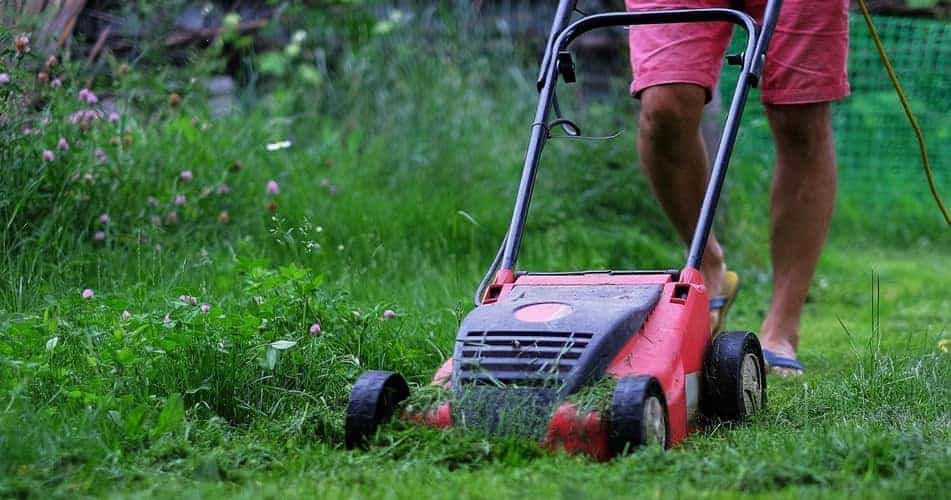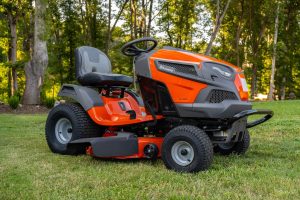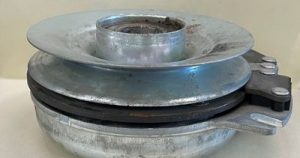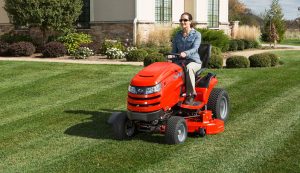Can You Use Your Electric Lawn Mower in The Rain?
It’s Saturday morning, the day you set aside to mow the lawn with your brand-new electric lawn mower. You’re all set and ready to go, you look out the window and your heart sinks because it’s raining. Now, you start to wonder if you can mow the lawn in the rain.
As a general rule, you should avoid using your electric lawnmower in the rain. While many models can be safely operated in wet conditions, you risk damaging the mower or injuring yourself due to the general risks of mowing in rain. Mowing during rain will also result in poorly cut grass.
While many of the more modern electric mowers are specifically rated to keep moisture out, that doesn’t mean that it is a great idea to use them in the rain.
Read on to get the specifics of each of these potential sources of harm and what to do if you really need to cut the grass during a rain shower.

This post may include affiliate links. Purchases made through these links may provide a commission for us, at no extra cost to you. As an Amazon Associate, we earn from qualifying purchases.
Follow all safety instructions provided in your equipment operator’s manual prior to diagnosing, repairing, or operating.Consult a professional if you don’t have the skills, or knowledge or are not in the condition to perform the repair safely.
Table of Contents
Are Electric Mowers Ok in the Rain?
Whether you just want to tough it out or you live someplace where it’s always raining so you have no choice, sometimes it’s necessary to mow regardless of the weather. Can electric mowers handle the rain?
First, check your owner’s manual. Virtually every company warns of the potential hazards involved with mowing in the rain. As we said above, you risk:
- Harm to yourself
- Damage to your lawn mower
- Doing a poor job cutting the grass
So, if you have the choice, we recommend that you always choose to mow when the grass is dry and when the skies are clear, even if your electric mower’s owner manual says it is waterproof.
The Physical Danger of Mowing Wet Grass
Although it is unlikely that you’ll hurt yourself when mowing wet grass, the chance is not zero. First, there is electricity to consider. As everyone knows, water and electricity don’t mix well.
Without losing ourselves in the physics, just know that a standard 120v outlet can potentially kill you should something go wrong.
If you are using an electric lawnmower in the rain that is powered by an electric cord plugged into an ordinary household outlet, you could be putting yourself at risk of shock.
The other type of danger is that which comes simply from treacherous footing. It is much easier to slip and fall when pushing a heavy mower through wet grass than it is doing the same through dry. Falling on a running mow, electric or not, could easily lead to injury or death.
It’s best not to risk injury by shock or slip, even if it is unlikely.
You can mitigate the risks somewhat. If you use a UL-listed extension cord that is rated for outdoor use and has three prongs (for grounding purposes), you can reduce the chances of injury compared to a cord that doesn’t meet such requirements.
Even better is a battery-powered motor that doesn’t use a cord.
In terms of safety, battery-powered are generally better than corded in most, if not all, situations. But we cannot stress this enough, do not overlook your personal safety and always do your best to avoid dangerous situations.
Electric Lawn Mower Left in Rain
Although in some instances an electric lawn mower might get wet from someone using it in the rain, there is also a possibility of it getting wet simply from being left out during a rain shower.
If this happens to you, you will likely want to know what it means for your mower. Will a brief shower of rain harm my lawn mower, or can it take a bit of moisture?
Generally speaking, exposure to rain or water is not good for your lawn mower and should be avoided when possible. If the amount of time involved is reasonably short, the lawn mower will, most likely, be okay.
Lawnmowers are designed in such a way that they shed most water that falls down on them. Said water will run off and be diverted away from critical components of the mower.
Many people even wash their mowers off with spray from a hose, which is fine, as long as they avoid spraying water on the engine.
All that being said, the threat of damage is not nonexistent. Many lawn mowers protect their motors with specially designed cases that keep most of the water and other foreign matter off.
However, to keep the motor from overheating, the cases are usually designed with vents that allow hot air to escape. This can be a problem when a long-lasting rainstorm is involved.
If water gets into those vents, it will, in turn, find its way to the motor and the wiring and will have a detrimental effect on the whole electrical system.
There is also some limited concern with respect to the battery as well. Although the battery casing of an electric lawnmower is often made with water resistance in mind, the casing is often placed on a hinge to allow access to its inner compartment.
As a result, there is a small gap around the casing that can let in water if exposed to it for a long enough period of time.
If a large enough amount of water gets into the battery compartment, it can damage the battery and its connectors. Basically, any excess moisture is a bad thing for any electric lawn mower.
If your electrical system is damaged, your lawn mower may not even turn on. Alternatively, it might turn, but you may find that it runs with less power and does a much poorer job.
All that, because of a rainstorm.
How Does Rain Affect Your Lawn Mower?
As we have said, moisture can damage a number of components of an electric lawn mower. We’ve already discussed the physical danger to yourself that comes from mowing on wet grass, so we won’t repeat that here.
Instead, let’s look more closely at what can happen to your machine:
- Your Mower May Short Out: Because of the excess moisture in your mower, it is possible for it to short out. If this happens, the electricity that powers it may find itself diverted from where it’s supposed to go to someplace it’s not. In some instances, an electrical fire may result or the emission of harmful fumes. One sign of such is the presence of smoke.
- Spark Plug Damage: Your spark plugs are needed to ignite your fuel and get your lawn mower running. If they suffer from moisture buildup, they may not work properly or may not even fire at all. Fortunately, they can be cleaned or replaced with relative ease.
- Water Can Getin Your Gasoline: As mentioned previously, water might be able to get in your gasoline. If this happens, it will diminish performance over the short term, and may even lead to corrosion of internal parts over the long term.
Those are just a few of the potential hazards for your lawn mower should you choose to use it during the rain or immediately afterward.
Can You Mow Wet Grass?
The effects of mowing wet grass on your lawnmower might not be immediate. But regardless, there are a number of both short and long-term consequences of which you should be aware.
First of all, the quality of the cut is often affected adversely when cutting in wet conditions. Your mower will likely cut the grass unevenly and the grass may even look worse than it did before you started.
The tires of the mower, as well as your feet, may press down on the soft, wet soil and leave unwanted impressions. There may also be a concern for the growth of fungi and other diseases made possible by ragged tears in the grass.
There are also concerns about how the mower deals with the wet grass:
- The mower deck could easily get clogged by a buildup of clinging wet grass clippings. This might even be more pronounced should you try mulching instead of bagging the clippings or spraying them out the side. If left to themselves, wet clippings can lead to corrosion and then rust.
- A similar problem happens with the mower deck. Cut wet grass sticks to the bottom and will eventually build up. In time, the collected moisture can lead to mold, and that’s another problem you don’t need.
- One more machine issue occurs when the clippings get so clogged up underneath that they disrupt the motion of the mower blades. This can stress out the engine, which, in turn, can damage your machine.
- Another critical problem arises when moisture accumulates on the inner components of your machine, particularly the motor. Such an event can mess up the proper functioning of your whole mower.
The problem is that electric mowers run on electricity channeled through insulated copper wiring. If there is enough water present, the insulation to this wiring might be rendered useless allowing for a short to occur.
If a short occurs while you are running the mower, you run the risk of developing serious electrical issues in your machine as well as (and more importantly) subjecting yourself to electric shock. And that’s definitely something you want to avoid.
There are a number of other reasons why you should avoid mowing wet grass. For one, wet grass tends to clump which, in turn, can lead to a patchy lawn.
Wet grass, in general, is just more difficult to mow properly. It bends over and stays bent over, whereas dry springs back up so that the mower blades cut it more readily.
You may also have difficulty if you are bagging your clippings. Not only will the bag get wet, but it will also be heavier and more difficult to move. There is also a greater chance that the collection box inlets will get jammed.
As a result, you may find batches of uncollected clippings scattered across your lawn. These must be tended to, especially if there is a large amount, or they may kill the grass underneath. The mulching of the mower is also less effective because of the wet clippings.
And, as noted previously, mowing wet grass is more likely to damage your lawn. The mower may leave behind ruts or even uproot some of the grass, your feet will often leave behind footprints, and your soil may be compacted by the passing of your mower.
This will negatively affect the grasses or other plants you may try to grow.
What If You Have to Mow Wet Grass?
Sometimes you have no choice, and you absolutely have to mow your lawn in the rain or just after when the grass is wet.
Maybe you live in an area of the country where there is constant rain during the summer. Or maybe you’re just a little reckless. Regardless of your reasons, you should still take certain precautions.
- Make Sure Your Yard is Clear: When mowing, you should always make sure your yard is clear of debris. This is doubly true when mowing a wet lawn because it is easier to slip, trip, and fall when such debris is coated by a thin film of water. Plus, debris can damage your mower if you run over it.
- Wear Proper Clothing: This means shoes that don’t slip and long pants with long sleeve shirts. Keep yourself covered.
- Examine the Grass: Stiff grass cuts more readily than grass that bends over. Rain is more likely to produce grass that bends over. So, if it rains, try to keep that in mind.
- Keep Your Mower Blades Sharp: Sharp blades just cut better and may help mitigate the poorer quality cut you’d normally get when the grass is wet.
- Use Gasoline Stabilizer: If moisture finds its way into your gas while you are mowing, it may cause problems. A gas stabilizer should help offset that.
- Raise Your Mower Deck: Although this may prevent you from getting a cut as short as you want, it will give you more room for your mower to do its work. The clippings will have more room to swirl about and out and will be less likely to bog down your machine.
- Use Your Side Chute: For best results, you should avoid using the bag or the mulcher because both are more likely to lead to clogging when the clippings are wet. The side shoot lets you discharge clippings so they are out of the way.
- Mow in Narrower Passes: If you find that there is too much buildup occurring as you mow and it is interfering with the rotation of the mower blades, try reducing the width of the passes you make. This should reduce the amount of clippings the blades need to deal with at one time. It should reduce stress and allow for improved rotation.
- Clear Beneath Your Deck Between Passes: If you keep the underbelly of your machine relatively clean throughout the process, it will reduce stress on the motor and will make for an easier job.
- Be Aware of Your Battery Charge: Mowing wet grass is more taxing on your machine so it will drain more power. You may run out of power by the time you finish your yard. If you have a spare battery that may not be a problem, otherwise, you may have to recharge your battery halfway through.
- Rake Your Clippings Afterwards: You don’t want to leave piles of clippings on your lawn because they will smother the grass underneath. So, unless you want a lawn spotted with yellow patches, it’s good practice to rake up your clippings as soon as possible.
- Clean Your Mower When You Finish: It’s especially important to clean your mower if you used it on wet grass. Moisture buildup can lead to mold and other problems. To prevent that, make sure you clean underneath the mowing deck, the blade, the air inlets, and even the filters. Do what you can. It will save you from trouble later.
So, those are some tips for mowing wet grass, but we would like to re-emphasize the point that you really should do your best to only mow when the grass is dry. Although the chance of a mishap is small, there are real hazards to both you and your machine should you mow in the rain.
How Do You Dry Your Lawn Mower?
If by chance, you leave your lawn mower out and there is a serious rainstorm, you should make the effort to dry it off before you use it again. To be safe, you shouldn’t even try to turn it on until you are sure it has been dried.
To dry your mower, you should start by taking it apart to expose the motor. Once you’ve done that, you should dry both it and the wiring with a handheld blower, fan, or similar method.
Letting the mower sit in the sun during on a dry breezy day will also help dry out your lawn mower.
You might also want to use a special cleaner for the electrical connections and even check for lost insulation resistance in the wiring by using a megohmmeter.
Regardless, it may take a good amount of time to dry the machine thoroughly.
Conclusion
We hope that discussion dissuades you from mowing your lawn in the rain or when the grass is wet Generally speaking, it’s not a good idea and is far more likely to cause more trouble than it is worth.







